Over the past several years, numerous issues associated with the expanding cryptocurrency business have been uncovered. Policymakers around the world have little choice but to incorporate virtual money into existing legislation. It seems that only rigid regulation can mitigate security risks, protect customers from unpredictable losses, and prevent financial crime.
While some countries adopt a welcoming attitude that encourages more crypto firms to enter their regional market, others focus on reducing associated risks or prohibiting access to digital currency entirely.
It may be difficult to comprehend the global approach to cryptocurrency regulation. That’s why we gathered information on the biggest crypto markets to present an overview of their most current regulations.
Should Cryptocurrency Be Regulated?
People’s interest in digital currency has been growing for quite some time.
The increase in demand encouraged many new crypto startups to join the market. Soaring public interest and rapid market growth did not come without challenges for regular clients and regulatory authorities.
Cryptocurrencies’ promise of anonymity may be lucrative to some people, but authorities worldwide have expressed concern about illicit uses of virtual currency, such as money laundering, terrorism financing, and financial fraud.
Another risk involved in the crypto industry is security. There are crypto wallet providers that don’t assess the security risks of their platforms efficiently, thus potentially exposing their clients to data theft.
The challenges faced by the industry may only continue to grow. Thus, regulatory bodies are getting more keen on regulating crypto providers to ensure a safe environment. For instance, the European Parliament recently finalized a cryptocurrency regulation that would encourage providers to enact safety checks and warnings, implement efficient security standards, and protect their clients. Regulators are also extending the current AML and CTF regulations to the crypto industry. Some even impose a travel rule – ending the anonymity pertaining to virtual currency transactions.
Cryptocurrency Regulation by Country
| The United States 🇺🇸 | Canada 🇨🇦 | Mexico 🇲🇽 |
| European Union 🇪🇺 | The United Kingdom 🇬🇧 | Germany 🇩🇪 |
| Estonia 🇪🇪 | The Netherlands 🇳🇱 | Malta 🇲🇹 |
| Russia 🇷🇺 | France 🇫🇷 | Singapore 🇸🇬 |
| China 🇨🇳 | South Korea 🇰🇷 | Japan 🇯🇵 |
| Australia 🇦🇺 | South Africa 🇿🇦 | Brazil 🇧🇷 |
Cryptocurrency Regulation in North America
The United States
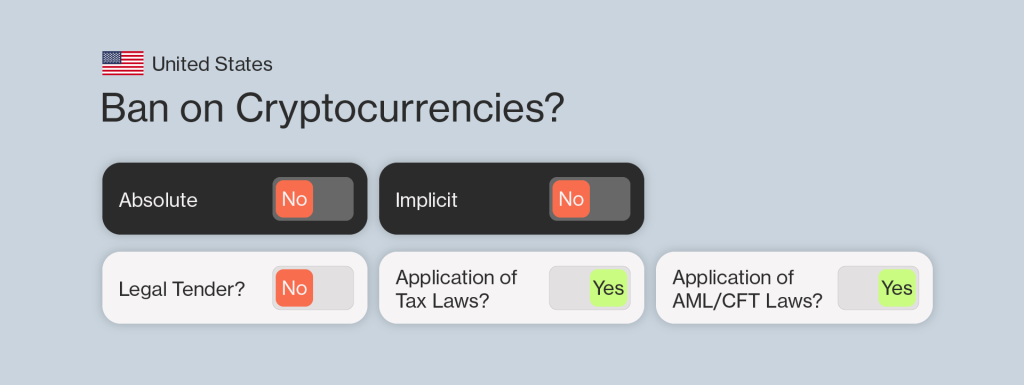
The United States is home to many prominent digital currency investors and blockchain companies, but the country still hasn’t developed a clear federal regulatory framework for digital assets. For now, each state decides on cryptocurrency regulation by itself, resulting in different regulatory environments across the country. Generally, several regulatory approaches are imposed at the state level: some states have created a favorable regulatory climate for digital currencies, while others impose restrictive crypto laws.
For instance, Wyoming is considered the most crypto-friendly state in the US. The jurisdiction has provided a clear and advantageous legal, regulatory, tax, and investor privacy regime for organizations related to digital assets, including non-fungible tokens (NFTs), cryptocurrencies, digital certificates, and similar assets.
On the other hand, New York is known for its harshest digital currency regulations in the country. To operate in this state, cryptocurrency exchanges need a BitLicense. However, getting approval is an expensive and complex process.
Canada
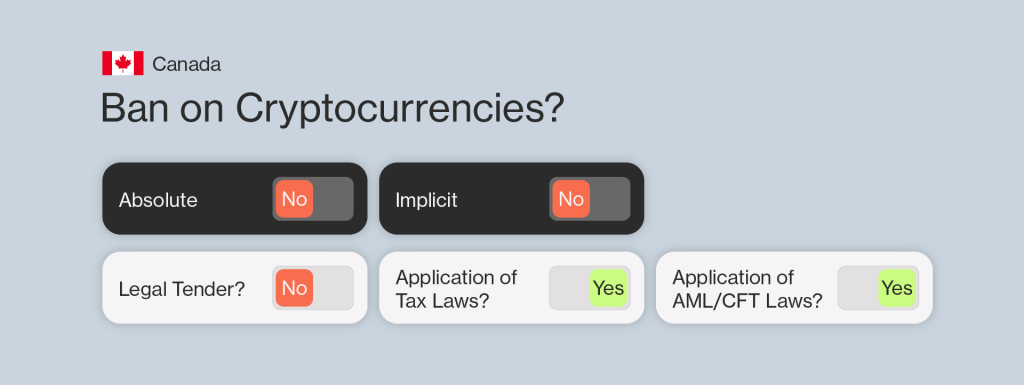
While Canada allows the unrestricted use of all digital currencies, including cryptocurrencies, they are regulated as money services businesses. Canadian regulatory bodies require companies dealing in virtual currencies to register with the Financial Transactions and Reports Analysis Centre of Canada (Fintrac). They must implement compliance programs, keep records, report suspicious or terrorist-related activity, and check if their customers are PEPs.
The Canadian Income Tax Act of 1990 is extended to cryptocurrency transactions and applies taxation. Cryptocurrencies themselves, however, are not considered legal tender.
It’s worth noting that most Canadian banks won’t allow people to purchase cryptocurrency using their credit cards. It includes the Bank of Montreal and Toronto Dominion.
Mexico
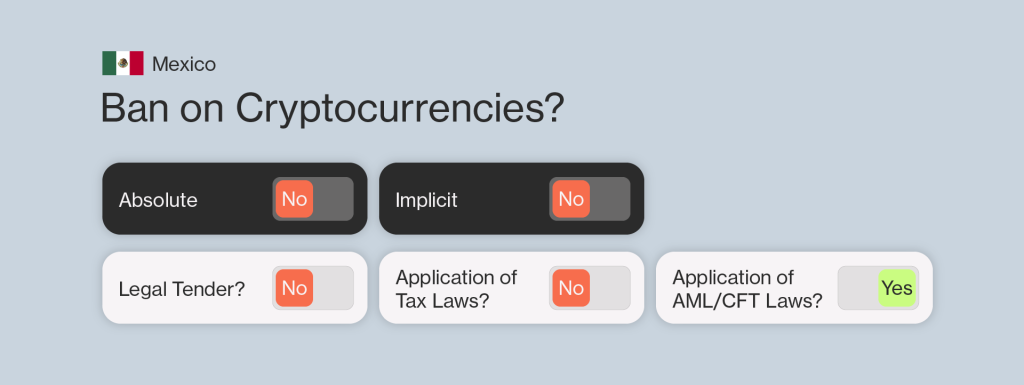
Cryptocurrency is legal in Mexico but is not considered legal tender. Nor is there a tax rule that references digital currencies. Thus the standard regulations apply.
Regulated financial institutions are not allowed to offer or trade cryptocurrency, but they can carry out transactions with virtual assets.
When a financial institution transacts with virtual assets, it must adhere to the 'Fintech Law,’ which requires it to develop an AML prevention manual, establish an internal AML department, and implement a risk-based approach analysis of AML risks.
However, the requirements are slightly more flexible for legal and natural persons executing virtual transactions that are not considered financial institutions. They must be registered with the SAT (Tax Administration Service) and report transactions that exceed approximately $2,800 in one transaction or accumulated transactions over a six-month period.
In Mexico, regulators regularly revise policies related to fintech. Thus, it is probable that more crypto regulations regarding virtual assets will be possible in the future. For example, in July 2022, Senator Indira Kempis proposed a bill to make Bitcoin legal tender in Mexico.
Cryptocurrency Regulation in Europe
European Union
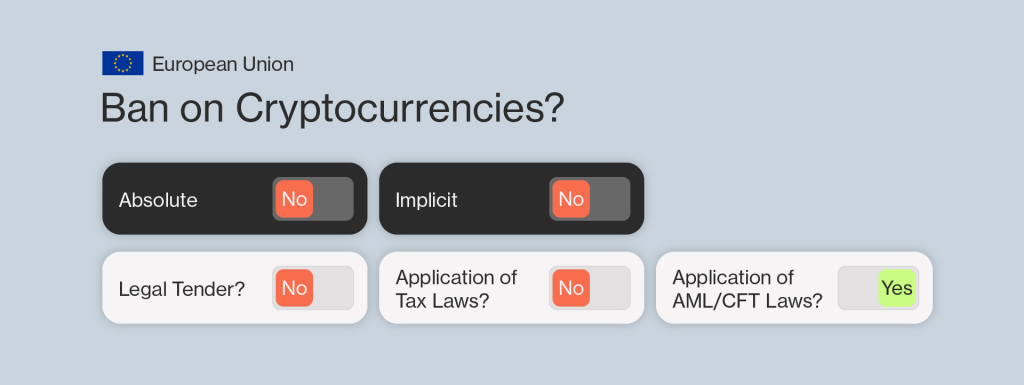
Some member countries already have national legislation for crypto-assets, but until now, there was no specific regulatory framework at the EU level. Finally, in June 2022, EU officials secured the first landmark law for the digital currency industry called the Markets in Crypto-Assets Regulation (MiCA).
The legislation focuses on crypto-asset types such as stablecoins and crypto-asset service providers, issuing new industry conduct rules and customer protection mechanisms.
Days before MiCA was approved, legislation that is part of the new EU anti-money laundering package was introduced. It details a new „travel rule” for digital currency assets. The so-called „travel rule”, which has been applied to traditional finance for a long time requires collecting information about the source of the asset being transferred and its beneficiary. It calls for transparency in the industry and ends the anonymity behind virtual currency transactions.
The United Kingdom
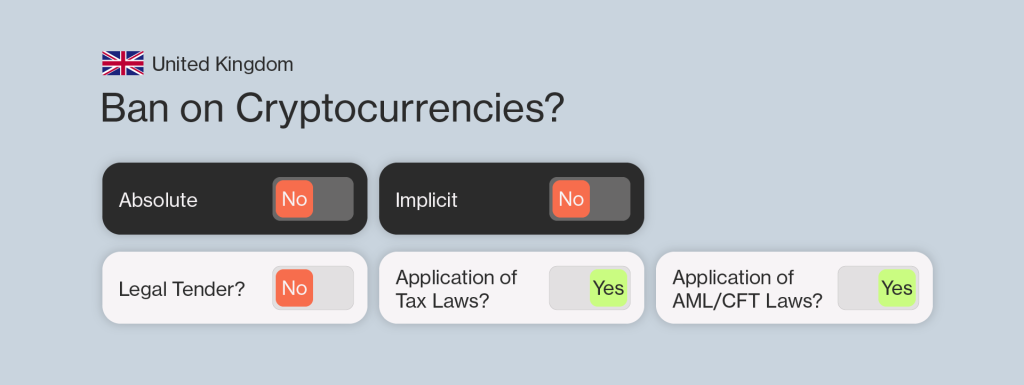
In the United Kingdom, virtual currency is legal. However, cryptocurrency ATMs were declared illegal by the Financial Conduct Authority (FCA) in March 2022. All of them had to be shut down across the country. The reason behind the decision is the providers’ failure to ensure compliance with KYC and AML regulations and implement appropriate protection for customers.
The United Kingdom declared in 2020 that crypto assets are property. However, the country doesn’t consider virtual currency legal tender, nor does it impose specific virtual currency laws. Yet, virtual currency exchanges must register with the FCA in order to start operations. They must also adhere to AML/CFT compliance obligations.
Germany
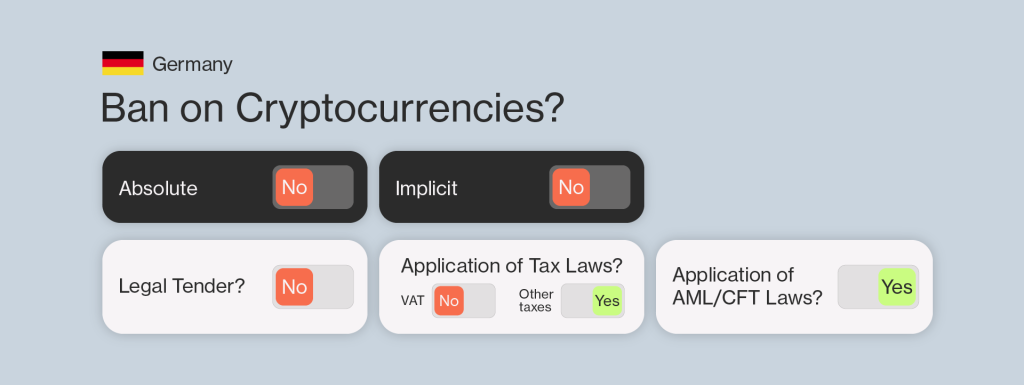
In Germany, virtual currency is not considered a legal tender, property, or foreign currency. Instead, the German Federal Central Tax Office considers cryptocurrencies as private money for tax purposes.
Germany has a beneficial tax regime for long-term investments and small profits. When individual investments in crypto are held over a year or if profits are below 600, asset holders are not required to pay tax.
Germany has implemented a Money Transfer Regulation closely related to the EU’s anti-money laundering directives. In August 2020, the Ministry of Finance and the Ministry of Justice drafted a bill to increase cryptocurrency regulation. The bill includes a travel rule that requires collecting information about the source of the asset being transferred and its beneficiary.
Estonia
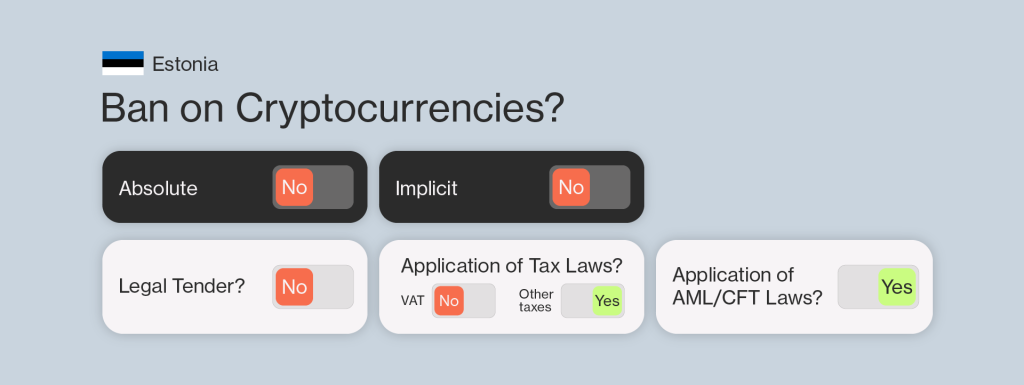
Estonia was one of the first countries to regulate virtual currency. The country regards it as a „value represented in digital form,” but not a legal tender.
The Estonian government has implemented a strict regulatory framework to control every virtual currency exchange and ensure that they adhere to rigid KYC and AML compliance rules.
After policymakers strengthened the legislation in 2020, cryptocurrency businesses started to be treated as financial institutions and must comply with Money Laundering and Terrorist Financing Prevention Act.
The Netherlands
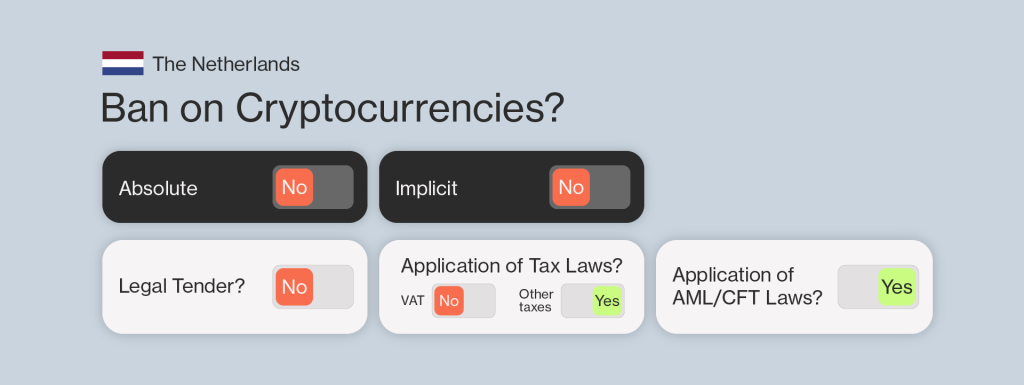
In the Netherlands, cryptocurrency is decentralized. It is not considered a digital currency or a legal tender. Cryptocurrency can be sold as goods. However, it is not required to levy VAT on cryptocurrencies.
Crypto exchanges are subjected to anti-money laundering and countering the financing of terrorism regulations. Providers are not required to report high-value payments. However, they must submit reports of suspicious activity, according to the Dutch AML act.
Mining crypto is permitted with no specific permits required. A large-scale mining operation may require an environmental permit.
Malta
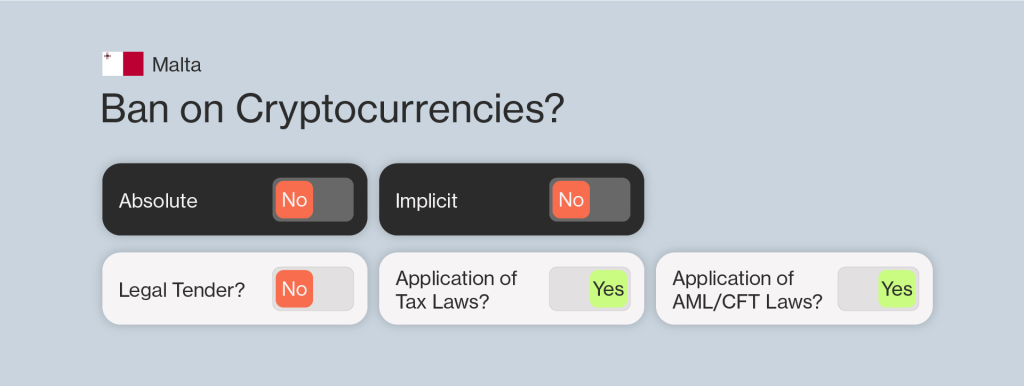
Malta is the first country in the world to deliver an innovative and comprehensive crypto regulation framework.
The country doesn’t recognize cryptocurrencies as legal tender but considers them „a medium of exchange, a unit of account, or a store of value.” The virtual currency is regulated via three landmark bills pertaining to digital assets: MDIA, ITAS, and VFA.
The bills detail that digital asset providers are subjected to AML/CTF regulations. There is no specific tax legislation, and VAT is not currently applicable to virtual currency transactions.
Russia
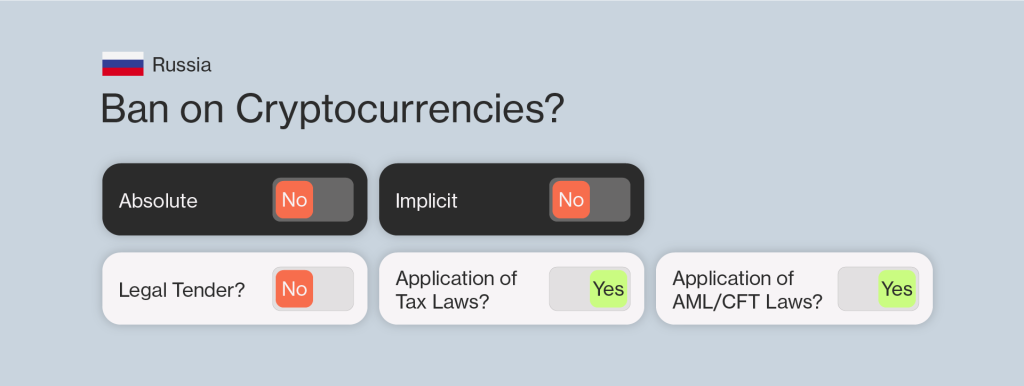
Even though the Central Bank of Russia proposed a ban on cryptocurrencies as well as crypto mining in January 2022, now the finance ministry aims to legalize cryptocurrencies as a means of payment.
Currently, all operations with digital currencies are subject to declaration and control by the Central Bank of Russia.
France
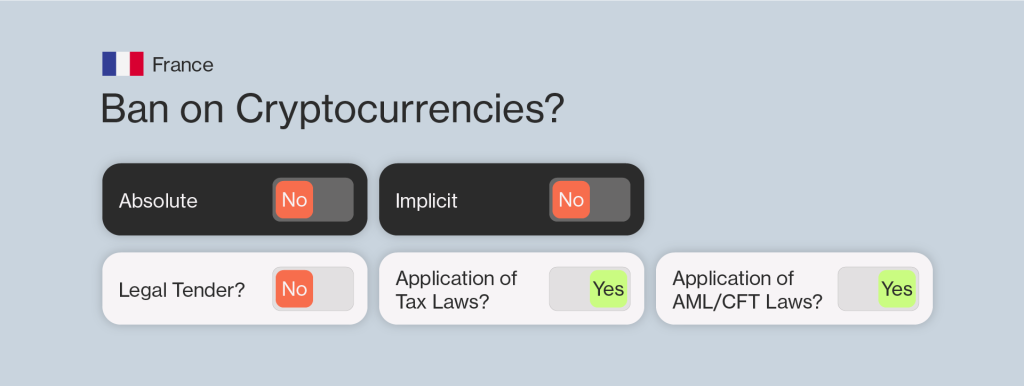
In 2019 France introduced regulations for digital asset service providers (DASP) and initial coin offerings (ICO) in the French Monetary and Financial Code (MFC).
Being a strict and comprehensive regulation, DASP is already in line with the upcoming Markets in Crypto-Assets (MICA) regulation imposed by the European Union.
Cryptocurrency Regulation in Asia
Singapore
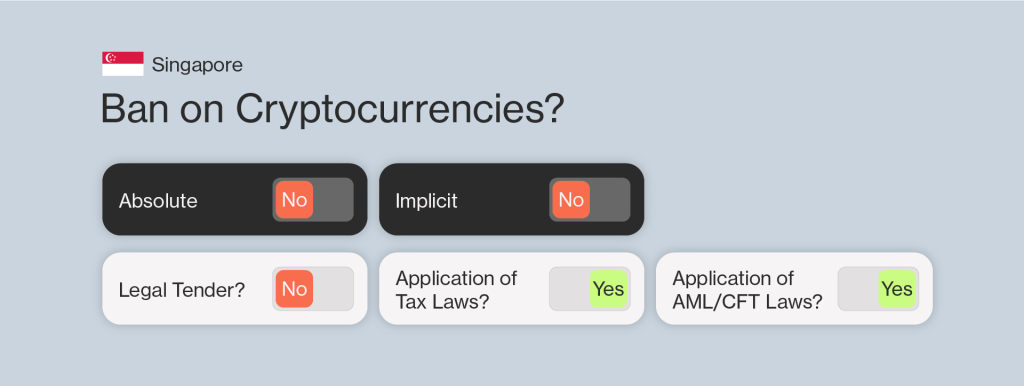
Singapore aims to create a balance between fostering the potential of cryptocurrency and exercising caution by recognizing possible risks. Thus, the country implements rigid AML/CFT regulations.
Depending on the virtual currency type, they may be considered capital markets products, e-money, digital payment tokens, or unregulated digital tokens. However, digital currency is not legal tender in Singapore.
Singapore does not impose taxes on capital gains, so when crypto is purchased for long-term investment purposes, capital gains are not taxed.
China
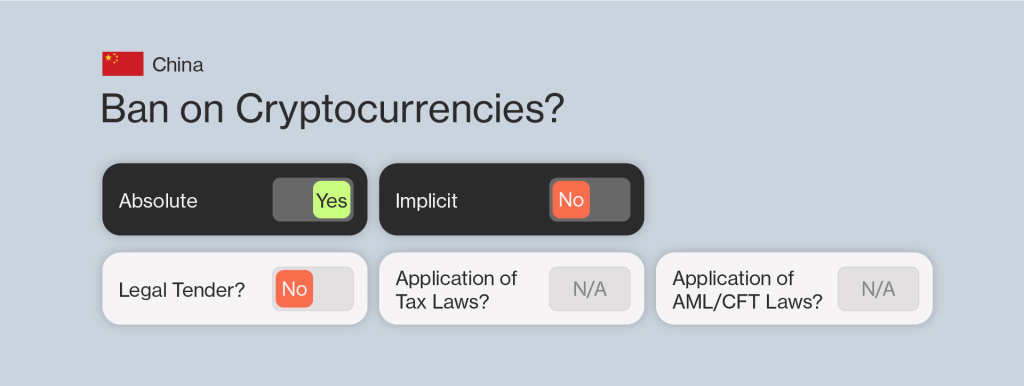
In China, cryptocurrency is not legal tender, nor is it legal. In 2019, China officially banned all digital currencies. All access to both domestic and foreign cryptocurrency exchanges was blocked.
China has joined the growing list of countries that restrict or ban all virtual currency, such as Egypt, Indonesia, and Nepal.
South Korea
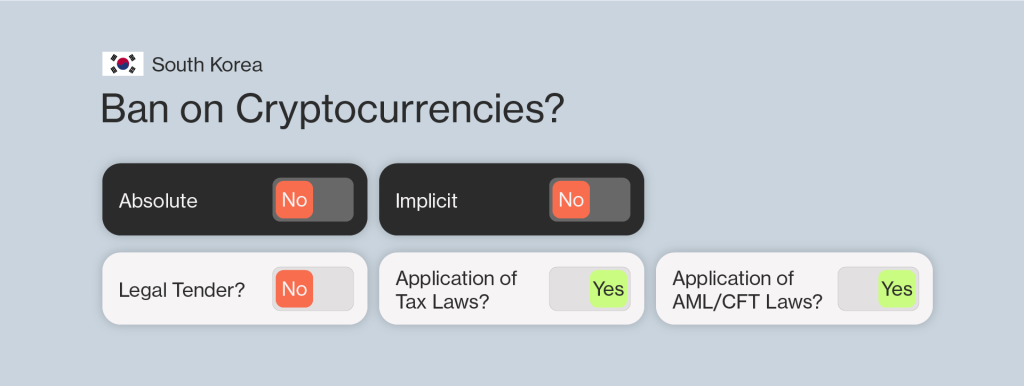
Virtual currency is legal in South Korea but are not considered legal tender.
The country has imposed transparency requirements on the cryptocurrency market, also known as the travel rule. It prohibits minors and all foreigners from cryptocurrency trading. While adults can only participate after verifying their identity. Thus, strict AML, KYC, and CFT mechanisms are implemented for the crypto industry.
Japan
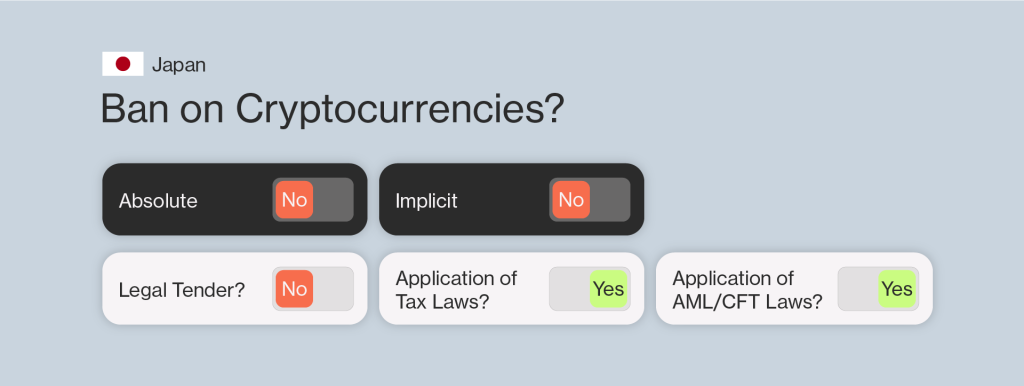
Japan’s Payment Services Act defines crypto-assets as payment methods not denominated in fiat currency and is legal property, but not a legal tender.
The regulation allows only registered cryptocurrency exchanges to operate and obliges them to comply with AML and CTF laws. Additionally they are required to keep records and take security measures to protect customers and investors.
Cryptocurrency Regulation in Africa
South Africa
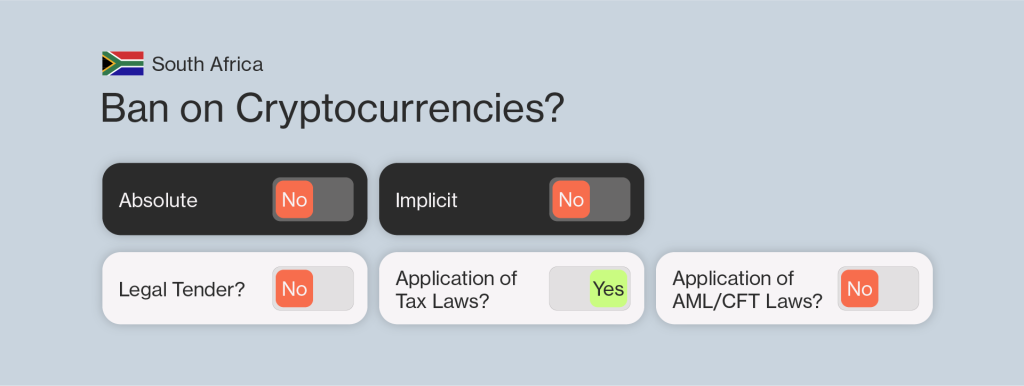
Currently, South Africa lacks a clear regulatory framework for cryptocurrency. According to the South African Revenue Service (SARS), regular income tax rules apply for virtual currency. Taxpayers must submit their crypto gains or losses as part of their taxable income. Crypto assets can also be subjected to capital gains.
In South Africa, digital asset providers are not subjected to anti-money laundering laws. However, the situation could change by the end of 2022 as the government is planning to introduce much stricter regulatory requirements
Cryptocurrency Regulation in South America
Brazil
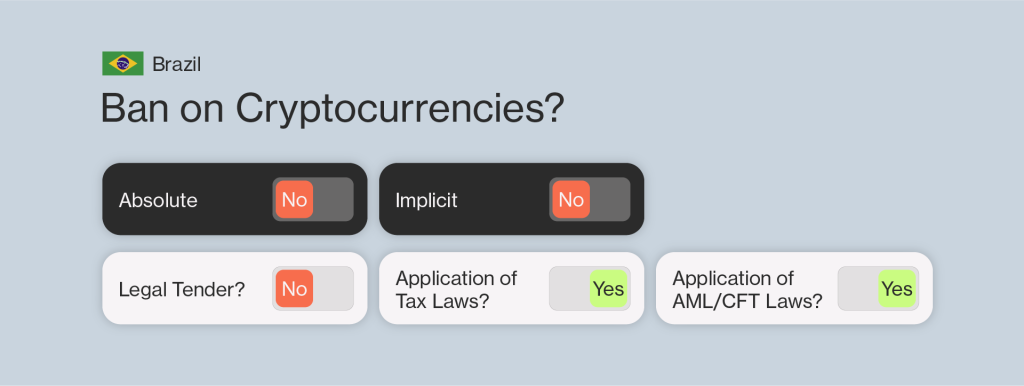
Brazil accepts digital currency as an alternative payment method and classifies it as goods or movable property, but it is not considered legal tender.
Recently, Brazil passed a bill to regulate virtual currency. The aim is to bring clarity into the industry and attract new businesses into the country. However, it is yet to be signed into law.
Currently, the existing legal and regulatory frameworks apply to virtual currency. Cryptocurrency organizations must follow AML laws to avoid penalties.
Cryptocurrency Regulation in Australia/ Oceania
Australia
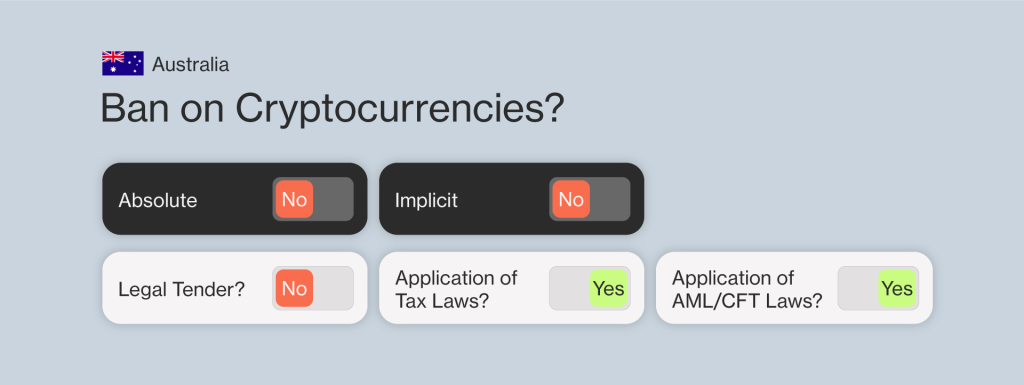
Cryptocurrencies are legal in Australia. The Australian government doesn’t equate virtual currency with fiat currency and doesn’t consider it to be legal tender.
Policymakers in the country encourage cryptocurrency growth. Thus, regulations on the industry are limited. However, digital currency exchanges must register with the Australian Transaction Reports and Analysis Centre. They are also required to comply with KYC and AML procedures.



